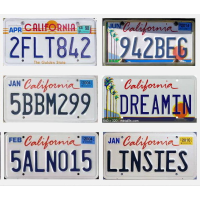Oakland Cops Resisted Limits on License Plate Scans until Hard Drive Filled

While the California Supreme Court ponders a lawsuit (pdf) challenging the collection and retention of license plate data by law enforcement scanners, Oakland is voluntarily putting limits on its own program.
Well, it’s not entirely voluntary. The Oakland Police Department said it ran out of room on its computer’s puny 80GB hard drive and had to scale back the length of time it will retain records from forever to six months. The department told Ars Technica that the elaborate procurement process prevented them from just buying an extra terabyte of memory. They cost around $50.
“We don't just buy stuff from Amazon as you suggested,” Sergeant Dave Burke told the publication. The computer, running on the XP operating system so old it is no longer supported by Microsoft, kept crashing.
The scaled-back policy, which now matches other jurisdictions like the U.S. Drug Enforcement Administration (DEA), may not necessarily be permanent. The department could ask for a new computer in the next budget cycle, but Burke said investigations rarely use information older than six months and the new policy probably won’t change.
Oakland started collecting license plate information with scanners attached to police cars in 2006. The devices automatically compare the plate to a “hot list” before storing the number, date, time and GPS location. They can read up to 60 plates a second.
San Jose is considering attaching the scanners to garbage trucks to gobble up even more info than their cops collect. Needless to say, this is loading information into police files on people who are not suspected of any crimes. By analyzing scanner data in bulk, personal information about people, including where they live, work and travel, can be ascertained.
Civil liberties groups are challenging the scanners in court, but aren’t getting very far in California. A three-judge panel of the California Second District Court of Appeal unanimously rejected a lawsuit in May brought by the American Civil Liberties Union of Southern California (ACLU) and the Electronic Frontier Foundation (EFF). The suit seeks access to one week’s worth of data gathered by the Los Angeles Police Department (LAPD) and the Sheriff’s Department to assess the scope of their activities.
The judges upheld a ruling by Los Angeles County Superior Court Judge James Chalfant that the records constituted part of official investigations and were not subject to a California Public Records Act (CPRA) request. The state Supreme Court agreed in July to hear an appeal.
Judge Chalfant acknowledged some of the dangers inherent in the scanner program. “The data will reveal whether police are targeting political demonstrations to help identify protesters, or other locations such as mosques, doctors’ offices or gay bars that might yield highly personal information,” he wrote in his decision.
But ultimately, that didn’t matter. Judge Chalfant decided that Section 6254(f) of the CPRA protects police investigatory files, and the appellate court agreed.
The police argue that the program’s shortcomings are outweighed by its contribution to catching bad guys. But a 2008 report from the police to the Oakland City Council noted that just 0.2% of the 793,273 plate scans registered a hit against the “hot list.” Ars Technica said that success rate has since declined to 0.16%.
–Ken Broder
To Learn More:
Cops Decide to Collect Less License Plate Data after 80GB Drive Got Full (by Cyrus Farivar, Ars Technica)
The Oakland Police Store License Plates on a Windows XP Machine—and It’s Been Crashing (by Gabe Carey, Digital Trends)
San Jose Looks at Using Garbage Haulers to Catch Car Thieves (by Ramona Giwargis, San Jose Mercury News)
Lawsuit over License Plate Scanners Heading to California Supreme Court (by Jason Henry, San Gabriel Valley Tribune)
State Appeals Court Lets Cops Hide License Plate Scans from the Public (by Ken Broder, AllGov California)
- Top Stories
- Controversies
- Where is the Money Going?
- California and the Nation
- Appointments and Resignations
- Unusual News
- Latest News
- California Forbids U.S. Immigration Agents from Pretending to be Police
- California Lawmakers Urged to Strip “Self-Dealing” Tax Board of Its Duties
- Big Oil’s Grip on California
- Santa Cruz Police See Homeland Security Betrayal in Use of Gang Roundup as Cover for Immigration Raid
- Oil Companies Face Deadline to Stop Polluting California Groundwater





